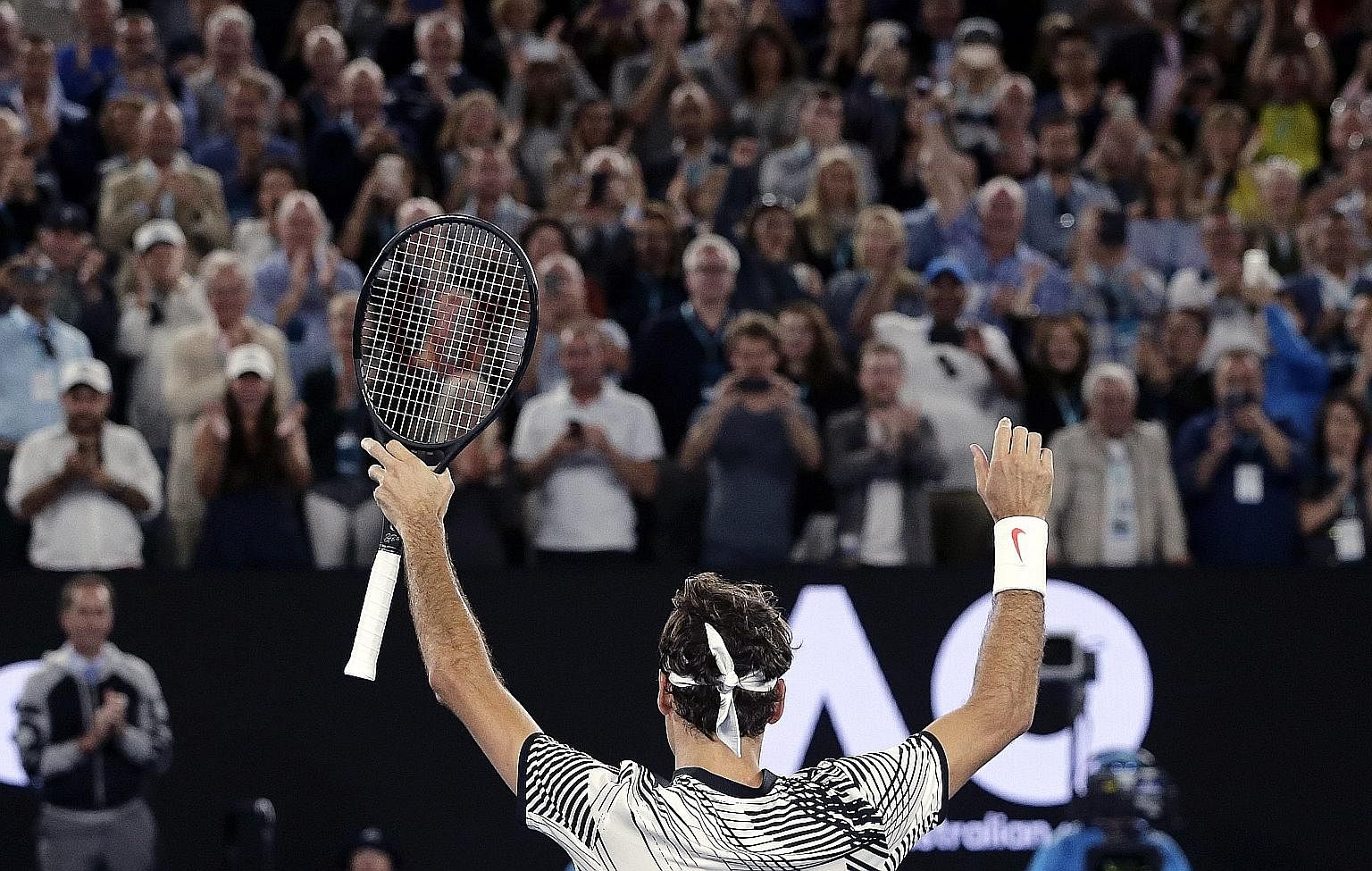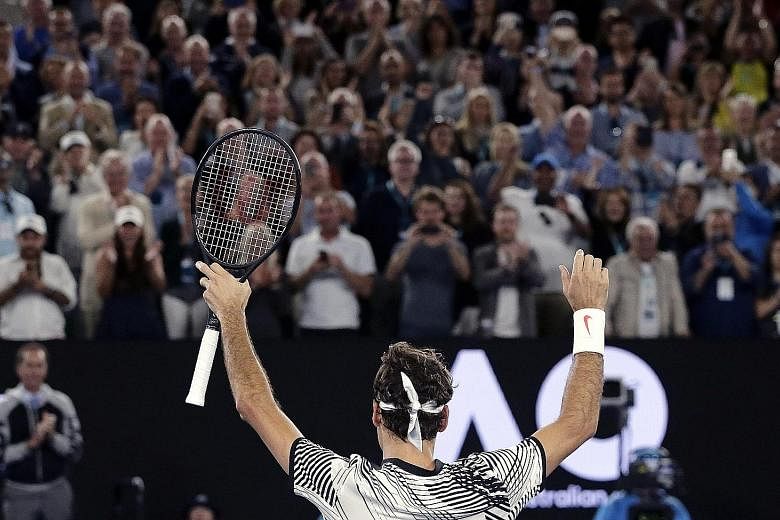The merely fantastic has become the utterly freakish. The long shot is still insisting he can be the big shot. The outside chance is still in with a fighting chance. Fourteen years after his first one, Roger Federer is in his 28th Grand Slam final. Then in 2003, he was a bachelor with a ponytail, now in 2017 he's a father who is spinning the tallest of tales.
After a brave, bewildering and occasionally breathtaking semi-final, strewn with 85 unforced errors and littered with drama, Federer finally beat Stan Wawrinka 7-5, 6-3, 1-6, 4-6, 6-3 in three hours and five tense minutes. He now leads their rivalry 19-3, proving that familiarity breeds conviction. After the last point he raised his arms in muted celebration, even in triumph not forgetting to be respectful of his hurting friend at the other end.
With every match here, Federer is scribbling a new history in awe and accomplishment. Six months out, two five-sets wins, an Open final. He is the oldest man since Ken Rosewall in 1974 to reach a Grand Slam final and if he adores Rosewall, Rod Laver, Roy Emerson and all those decent heroes of the past then he is their graceful inheritor.
On a cool night, as seagulls squawked, the crowd stood for two over-30 classics who had forged a rough-hewn epic. Two friends who scrapped to the point where both needed medical treatment and then they scuffled some more. Two men who made each other nervous. Roger Federer framed balls and Stan Wawrinka broke a frame. It was so unrelentingly tough that by the end the unthinkable had occurred: even Federer's hair was a mess.
More amiable and contrasting fellows for a high-tension match cannot be found than these Swiss. Federer is a talkative fellow who moves in sophisticated circles and Wawrinka is a sweetly, shy square. The Fed's clothes are part of the famous RF Collection, though Wawrinka's plaid shorts went one better and once turned into a collectible.
On court and off their languages are separate. Federer is from Basel, speaks Swiss-German and is a sneaky chap who uses guerrilla warfare while playing. Wawrinka hails from Lausanne, speaks French and fires tank shells when he has time to set up. Yesterday both seemed a trifle hesitant and very polite at the start.

At 2-1, Federer had Wawrinka at 0-40 but let his pal off the hook. In the next game, Wawrinka had Federer at 15-40 and repaid the favour. Then it got serious as Federer played a drop shot that soared, sank and spun back. Spectators roared though here a quick qualification is required: This was not a crowd in Rod Laver Arena but a congregation attending the Church of Roger. They are happy to cheer when he bounces a ball.
For two sets, Federer sliced, slithered to the net and slipped in drop volleys made from silk. He was marginally better, in fact millimetres so, which is the distance by which a Wawrinka backhand missed in the first set to create set point.
The second set swept by fast and Wawrinka could have wilted but instead revived. History will see the older man as the greater Swiss, but for now Wawrinka refused to be the lesser Swiss. "I'm proud of myself, of the fight I gave tonight," he said.
Minor margins have a major impact in sport and so it was here. Wawrinka's average first serve speed went up from 186kmh in the second set to 198kmh in the third and 191kmh in the fourth. Federer's second-serve points won dipped from 67 per cent in the second set to 43 in the third and 36 in the fourth.
Federer's serve wasn't switchblade sharp and Wawrinka's strokes felt like a broadsword's heavy blade. On a topsy-turvy day it was almost appropriate that Wawrinka, who owns the finest backhand in tennis town, should hit more than twice as many winners, 22, off his forehand.
"He relaxed mentally and played freely," said Federer, but could not himself. At two sets all, perhaps he felt his allocation of miracles for this month had run dry. Even tennis gods must surely have quotas.
But in the fifth set Wawrinka had two break points and couldn't grab them and Federer had one and seized it. Lucky, no. Great, yes. The best players are tightrope walkers; at the toughest times, they keep their balance.
As Wawrinka said, "Roger is a great fighter" and later added, "He is the best player ever, he can do anything he wants on court". Well, almost. In his last five Grand Slams, Federer has now gone F (final), F, SF (semi-final), SF, F. It is an astonishing run of letters for any player, but it is not enough for him. What he wants is a W.
We are used to Federer the graceful, but on this night it was Roger the resolute. More rugged than elegant, more desperate than divine, more unsure than in command.
Later, in the press room, in a beautifully revealing movement, he said:
"It's gone much better than I thought it would. That's also what I was telling myself in the fifth set. I was talking to myself, saying, 'Just relax, man. The comeback is so great already. Let it fly off your racquet and just see what happens'."
For years men have faced Federer with a tremble and reassured themselves by saying they have nothing to lose. Now this very man, who once evoked fear but is now older and weathered, says: "I think that's the mindset I have got to have, as well, in the final. Sort of a nothing-to-lose mentality."
This is precisely why sport is beautiful, for everything comes full circle. Even champions who have everything eventually come seeking fairytales.


